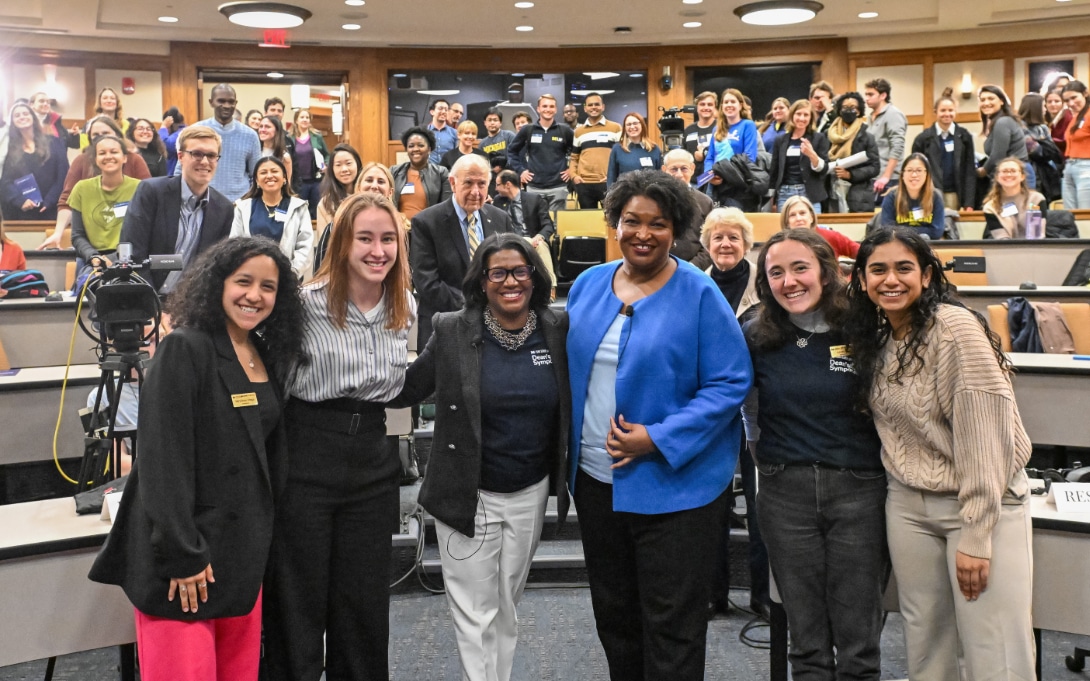
Two days of panels, chats, and keynotes focused on examining and seeking solutions to some of the biggest challenges we face in Michigan, in the United States, and across the globe. More than 400 students, faculty, staff, and friends attended in person or tuned in to the live stream for insightful discussion and to connect with speakers and fellow attendees.
Public Policy in the 21st Century: Charting the Course
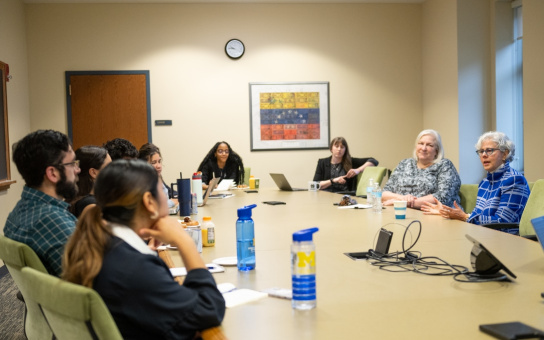
In an intimate conversation with Ford School students, Cecilia Muñoz spoke about navigating her career journey, lessons from her time in government, and how she stays hopeful.
On what she learned during her time in government: “Find a cohort of people who you can get honest feedback from so that you can up your game. I did that relentlessly and it helped. If you are someone like me, there will always be people who don’t think you belong at the table. They are wrong. We need a diversity of people and expertise around the table to make good decisions. … What’s important is that you know that you need to be there.”
On how to make an affirmative case for immigration reform: “The affirmative case is an evidence-based case. It is such an emotional issue and an issue of high politics … the evidence case is we actually need more immigration economically. Expanding the avenues for people to reunite with their own families and for employers to hire the people they want to hire. … It would be really good for us economically and socially. We don’t have a policy problem, we have a political problem.”
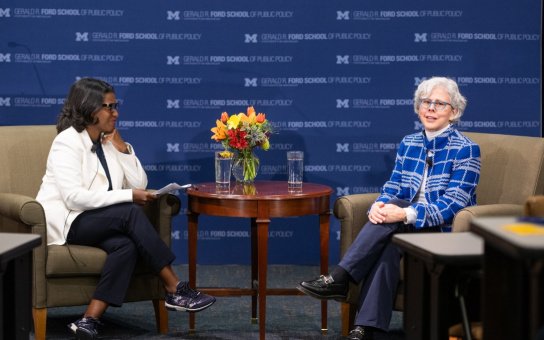
In her public talk, Muñoz addressed the importance of public policy in this moment: “It’s easy to be cynical about policymaking in this day and age. We have a lot that’s broken in our democracy. I see that as a call to double down. We live in a democracy which means we make decisions together on consequential things. If our ability to do that breaks down, that means a lot breaks down with it. … Every day, there are real reasons for hope. … We own this thing and we cannot afford to let this break. Public policy is a major tool through which we collectively address big problems. … Our biggest enemy is cynicism. In some ways policy school is a way to back the case this is an endeavor worth undertaking."
Watch the public talk here »
It's been such a special experience, in particular for people who have diverse interests as policy students often do. I'm just impressed and blown away by both the quality of the experts and speakers that we have coming in, and by their desire and willingness to engage with students at every level.”
Sheriff Almakki (MPP '24)
The AI Bill of Rights and the Future of Technology Policy
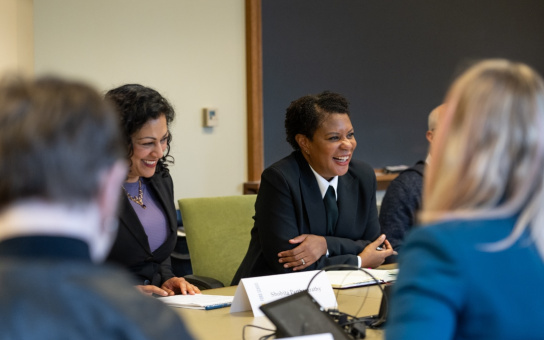
Alondra Nelson spoke to an eager group of BA, MPP, and PhD students over lunch.
“How do you get to yes? That’s policy innovation. For me, policymaking is like an institutional structure in which everyone's going tell you no. Where are the levers that you have, who are the collaborators and partners that you have? … It can be deeply frustrating, but also really creative and fun.”
On making a lasting impact in government: “The thing with policy in this moment is that it's always about implementation. So it's not about who's necessarily in office…it's about who's implementing it and how legislation, guidelines, and policies are being interpreted, and whether or not they're being prioritized or not. … There's a lot of variables that are just not the administration. Policy has both the immediate effect of the law change and it has a super long tail. So you may be keeping your eyes on both of those things.”
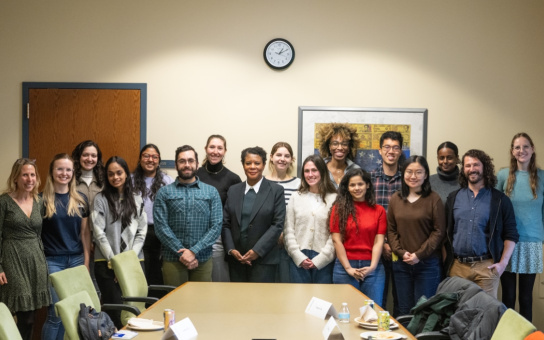
Nelson then met with an interdisciplinary group of faculty that included expertise in history, social work, engineering, computer science, political science, and information science, reflecting on her time in government. “We are too slow with the work, but we still need to be careful. For people who don’t work in policy spaces, that is fine. But I think for those of us who have made the choice to engage in policy conversations, the things that we publish and do … can have a material effect. So I think if people really got that, there would be a greater sense of urgency.”
In her public talk, Nelson addressed equity in technology and AI, and urged all policy professionals to think more about science and technology.
“There's no reason that we can't have innovation that's responsible, that's equitable. And when we are presented with a choice architecture that says that it's a zero sum game, that you get one or the other, that's just wrong."
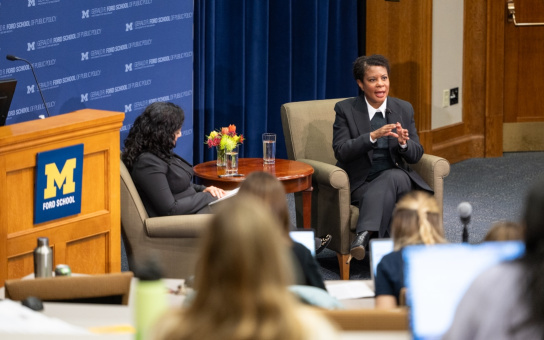
“It’s not magic. No one working in the policy space can afford to not reckon with science and technology policy. … If you're working on poverty or, you know, on unhoused populations or on issues with the disability community, like for you to do good policy in those spaces, you have got to get a piece of this. You don't have to be an expert, but you need to understand where it's really cross-cutting with these issues because it's a lot of decision vectors are being made, particularly using forms of technology in these spaces.”
Watch the public talk here »
American Democracy at the Crossroads
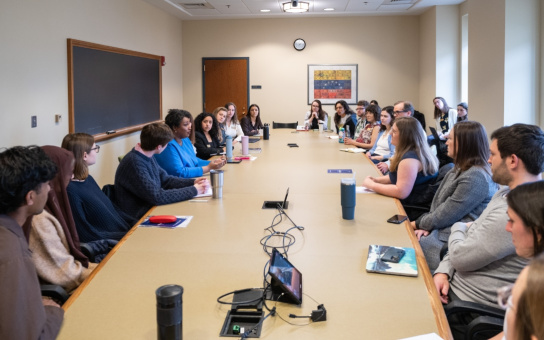
Stacey Abrams met with an excited group of 25 undergraduate and graduate students in a closed-door and wide-ranging discussion about democracy, creating change, and advice for students to take the next step in their careers. Reactions for students:
Stacey Abrams is the ideal figure to speak on entrepreneurship as well as local and state rights. As a Flint resident, local and state policy is so critical, especially in this election. It was beyond inspiring to hear from her today."
Mary Grace Ortega (BA ‘25)
As a fellow Georgian, I felt the impact that Stacey Abrams has had in my community … She is an amazing person who inspires me to make change. She is what it means to be Georgian and she gives us hope for the future."
Parker Short (BA '24)
It was just incredible to meet Stacey Abrams today. She's one of my heroes and I never would have thought I'd get the chance to meet her. She told me that I have what it takes to run for office and that's the best validation I could have gotten."
Mia Roub (BA ‘24)
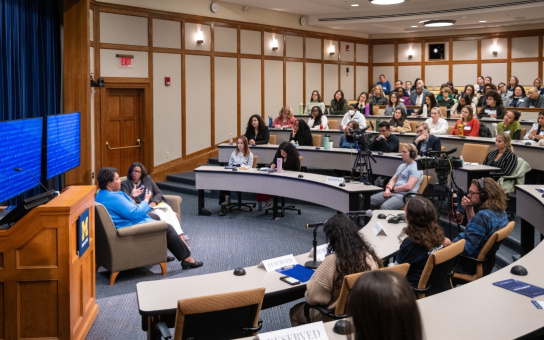
Stacey Abrams has been a personal political hero of mine … She shared so much wisdom with us and I'm so grateful for this opportunity and the advice that she gave us going into another crucial election year."
Audrey Clayton (BA ‘25)
In her public talk, Abrams discussed the importance of the diversity, equity, and inclusivity (DEI) movement:
“DEI describes 248 years of struggle to make America what it said it wanted to be. … It is about every community that has had to struggle to make the law recognize their humanity and their citizenship, and therefore we have to defend and protect DEI with every fiber of our being. Because DEI is a description of every movement we have had, because every one of those movements are pointed to the American dream. There are three ways you get there: education, economics, and elections. ... If we want to defend and protect democracy, we should defend them to protect DEI, because that is the way we hold ourselves accountable. When you can constrain who participates, you can then start to eliminate whose voices matter.”
Watch her public talk here »
The chance to see such a great and concentrated group of talks over the course of these two days has been so great for fostering new ideas and is a testament to Dean Watkin-Hayes' ability to bring people together who may not otherwise think they have much in common. We often think of policy areas as if they are silos, that we are working on climate change or racial justice or immigration or whatever, but really they are all interconnected and you make better policies by thinking through those connections and potential downstream consequences across a range of policy domains."
Associate professor Kaitlin Raimi
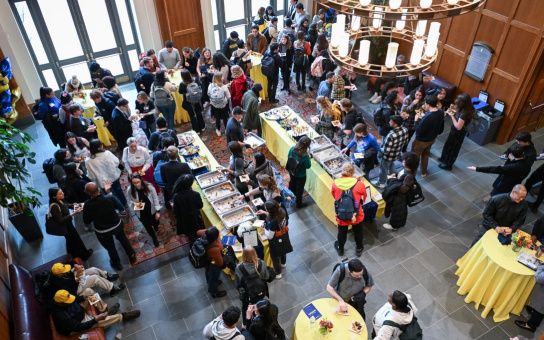
The racial justice panel made me think about democracy. I think a lot of the concerns around racial justice are around how does a democracy respond? Not just to the majority but to all the different groups within it? … [We have to ask] these questions about how our institutions can protect and be responsive to distinct minority groups."
Associate professor David Thacher
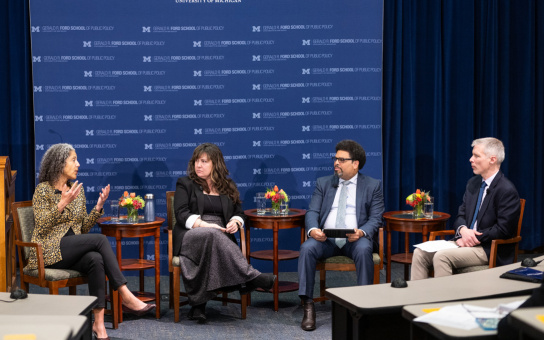
New Policy in Support of Families and Kids
“Maybe we should begin every economic class, every panel, with the question of, ‘what is the purpose of an economy?’We learned what, how, and to whom, but we don’t define the purpose of an economy. Then that leads to how do we use our fiscal tools to achieve that purpose. If you ask me, it is to facilitate human flourishing, self-determination in rightous ways, and agency.” —Darrick Hamilton, economics professor and director of the Institute on Race, Power and Political Economy at The New School;
“We lack a social rights contract. If we thought about housing or food or healthcare as a right … in the way that guns or free speech are rights, then we would have a whole infrastructure to get us there, as we do for those other things. We would have a legal bar that defends those rights in the way that we have a legal bar that defends the right of free speech.We would have technological innovation that would get us there.” —Mary Patillo, sociologist and chair of the Department of Black Studies at Northwestern University
“One of the fundamental problems, is that you have to file taxes to get this [tax credit]. So about 80% who are eligible for the EITC get it. We still don’t know how many people who didn’t get the child tax credit. Social security does a good job of making sure that it goes to everyone. Our government agencies should be able to work together to not leave anyone out.” —Natasha Pilkauskas, Ford School associate professor
Watch the video here »
As someone who is interested in education policy, I'm interested to learn about how climate policy and racial justice policy can inform my work and gain more understanding of the intersection of policy practices."
Vanessa Kiefer (BA '24)
Communicating Climate Change: Policymakers, Advocates, and Public Opinion
"One way we know things are bad for the climate is when it is bad for people. We have to care as much about people as we do about theoretical climate." —Donna Givens Davidson, president and CEO of Eastside Community Network
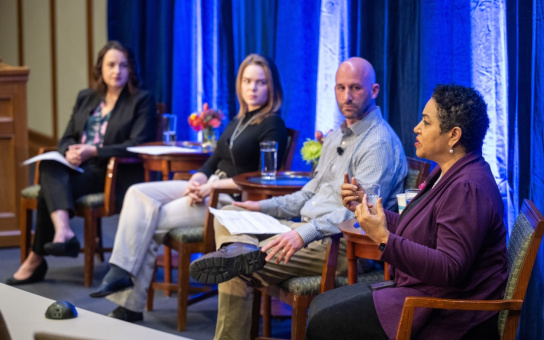
"The intersectionality between climate and democracy is huge. The way we change the culture is by getting more people engaged, getting people to understand the issues, getting more people to run for office. People often think there are climate issues and civil rights issues, and democracy issues. They’re the same thing. We need to start viewing them in the same way and having the same conversations." —Kara Cook, chief of staff for the Michigan Department of the Environment, Great Lakes, an Energy (EGLE)
"The policy context 100% dictates and sets the frame for how [climate policy] decisions are made. … People don’t see the direct link or connection. The way they’re actually experiencing most of our federal policy right now is through incetives. … cost for solar, EV policy. It’s a real communication challenge to make the connection between EV policy and public health." —Mike Shriberg, professor of practice and engagement at U-M SEAS
Watch the video here »
Racial Justice and Public Policy: Complexities, Challenges, and Priorities for Reform
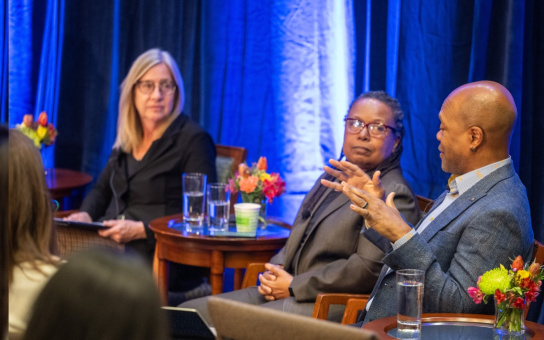
Panelists spoke on promising racial justice policy, teaching divisive topics, and finding joy in difficult work.
"There is no democracy without economic democracy and there is no racial justice without economic justice. I often hear racial justice very narrowly defined as an agenda that asks, 'what do people of color ... need that other people do not need?" And I think that's the wrong question. The question I ask is what do people of color need? As it turns out, they need what all humans need. They need good education, health care, housing, schools." —Mo Torres, Michigan Society of Fellows postdoctoral scholar and assistant professor at the Ford School and LSA.
As someone who studies young adults, this is a generational warfare. What does it mean when you teach an accurate history of this country and their ability to position themselves relative to the Democratic or Republican party. … There are these moments, in fact, what is in front of us feels like it will be realigning the power in this country. We have to take this very seriously in terms of ... how we teach history in this country. —Cathy J. Cohen, the David and Mary Winton Green Distinguished Service Professor at the University of Chicago
"What does democracy mean for different constituencies? ... It doesn’t look the same for everyone, based on power, based on class, politics, and so on. … Racial justice looks different for many people as well.” —E. Patrick Johnson, Dean of the School of Communication and Annenberg University Professor at Northwestern University
"An important debate if you move out of the US. about China, which has managed to in 40 years of economic reform eliminate extreme poverty. … The deal the Chinese government has made with its people is that we will give you a better life if you don’t bother us with how we give it to you. Political actors need to learn from China and countries like China about how you address deep poverty and social inequality and lack of social opportunity. … We cannot do that without also understanding the type of government that undergirds it." —Ann Chih Lin, associate professor of public policy at the Gerald R. Ford School of Public Policy and director of the Lieberthal-Rogel Center for Chinese Studies
WDC director Susan D. Page reflects on the racial justice panel:
This panel made me this about when we talk about democracy, it's really incumbent upon us to realize that democracy means different things to different groups. On the global scale, there's often these comments that democracy doesn't work in Africa, but in fact, they're just as stratified as other societies where maybe their priority is economic democracy or economic justice, or being able to find a job or housing … I think it’s something something that is often missed that we think of groups as monolithic."
Watch the video here »
The State of Democracy around the World
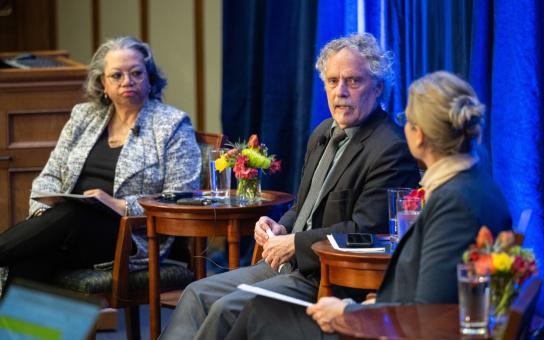
On what U.S. foreign policy can do to bolster democracy health elsewhere and if it makes you optimistic or pessimistic about the future of democracy: It’s going to be more of a grind and more of a fight, and one that that we Americans who are devoted democracy, have to work in partnership with people in those countries, not telling them how to run their countries is not preaching the virtues of democracy, but rolling up our sleeves and working with them to build the fundamentals of a pluralistic society of strong civil societies, of good political organization, and ultimately of free and fair elections. … We know that there's a pretty negative vibe out there in our system right now. … It's up to us. This is not ‘them’ is going to fix this one. We're not going to have others come in here and tell us how it gets better. We all have to play our role as citizens and as political activists. We have to invest in this system. If we check out, then we are going to get the worst outcome." —Stephen E. Biegun, board member of the National Endowment for Democracy
On U.S. responsibility for democracy backslide around the world: "We certainly play a role and we often say that we support Democratic change… but the U.S. is like any government. We like what we think of as stability, even when that stability is not terribly democratic. It’s very difficult for our government to support groups that are amorphous." —Weiser Diplomacy Center director and former Ambassador Susan D. Page
On what else U.S. agencies should be doing: "You can’t consistently always pursue both your values and your interests. There are some countries where it's just going to be very hard for us … to have a sustainable, long-term interest that we are going to impact through our engagement. I think we can and we should try where we can, but there's so much that we can't really control. There are so many other forces that are affecting what's happening in other countries." —David Caroll, director of diplomacy programs at the Carter Center
Watch the video here »
The Dean's Symposium has been such a great reminder of why I feel so lucky to be a part of the Ford School community. The work and issues being showcased these last few days by faculty, alumni, and of course by our amazing leader Dean Celeste Watkins-Hayes, has been nothing short of inspiring."
Kellen Epstein, associate director, Ford School Development